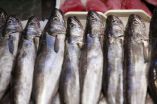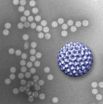(Press-News.org) Bethesda, MD—A drug currently being used to treat ischemic strokes may prove to be a significant advance in the treatment of tuberculosis and ulcers. In a new research report appearing online in The FASEB Journal, a compound called ebselen effectively inhibits the thioredoxin reductase system in a wide variety of bacteria, including Helicobacter pylori which causes gastric ulcers and Mycobacterium tuberculosis which causes tuberculosis. Thioredoxin and thioredoxin reductase proteins are essential for bacteria to make new DNA, and protect them against oxidative stress caused by the immune system. Targeting this system with ebselen, and others compounds like it, represents a new approach toward eradicating these bacteria.
"This new antibacterial principle provides better chances of surviving an infection," said Arne Holmgren, M.D., Ph.D., a researcher involved in the work from the Division of Biochemistry in the Department of Medical Biochemistry and Biophysics, at Karolinska Institutet in Stockholm, Sweden. "Since ebselen is also an antioxidant, the present mechanism can be described as a 'two for the price of one' antioxidant action in inflammation, and specific targeting of multi-resistant bacterial complications and sepsis."
Building on previous observations where ebselen has shown antibacterial properties against some bacteria, Holmgren and colleagues hypothesized that the bacteria sensitive to ebselen relied solely on thioredoxin and thioredoxin reductase for essential cellular processes. They investigated this by testing it on strains of E. coli with deletions in the genes for thioredoxin, thioredoxin reductase and the glutaredoxin system. They found that strains with deletions in the genes coding for glutaredoxin system were much more sensitive than normal bacteria. Researchers further tested ebselen against Helicobacter pylori and Mycobacterium tuberculosis, which both naturally lack the glutaredoxin system and are frequently resistant to many commonly used antibiotics, and found both to be sensitive to ebselen.
"As rapidly as these organisms evolve, we need new drugs sooner rather than later," said Gerald Weissmann, M.D., Editor-in-Chief of The FASEB Journal. "The fact that these scientists have found a new target for killing some of the most resistant bacteria is great news, but the fact that we already have at least one drug which we could possibly use now makes the news even better."
###
Receive monthly highlights from The FASEB Journal by e-mail. Sign up at http://www.faseb.org/fjupdate.aspx. The FASEB Journal is published by the Federation of the American Societies for Experimental Biology (FASEB). It is among the most cited biology journals worldwide according to the Institute for Scientific Information and has been recognized by the Special Libraries Association as one of the top 100 most influential biomedical journals of the past century. FASEB is composed of 26 societies with more than 100,000 members, making it the largest coalition of biomedical research associations in the United States. Celebrating 100 Years of Advancing the Life Sciences in 2012, FASEB is rededicating its efforts to advance health and well-being by promoting progress and education in biological and biomedical sciences through service to our member societies and collaborative advocacy.
Details: Research Communication: Jun Lu, Alexios Vlamis-Gardikas, Karuppasamy Kandasamy,
Rong Zhao, Tomas N. Gustafsson, Lars Engstrand, Sven Hoffner, Lars Engman, and Arne Holmgren. Inhibition of bacterial thioredoxin reductase: an antibiotic mechanism targeting bacteria lacking glutathione. FASEB J doi:10.1096/fj.12-223305 ; http://www.fasebj.org/content/early/2012/12/17/fj.12-223305.abstract END
Stroke drug kills bacteria that cause ulcers and tuberculosis
New research in the FASEB Journal shows that a compound called ebselen kills bacteria through the inhibition of thioredoxin reductase
2012-12-20
ELSE PRESS RELEASES FROM THIS DATE:
UGA research offers new targets for stroke treatments
2012-12-20
Athens, Ga. – New research from the University of Georgia identifies the mechanisms responsible for regenerating blood vessels in the brain.
Looking for ways to improve outcomes for stroke patients, researchers led by the UGA College of Pharmacy assistant dean for clinical programs Susan Fagan used candesartan, a commonly prescribed medication for lowering blood pressure, to identify specific growth factors in the brain responsible for recovery after a stroke.
The results were published online Dec. 4 in the Journal of Pharmacology and Experimental Therapeutics.
Although ...
Virtual reality and robotics in neurosurgery -- promise and challenges
2012-12-20
Philadelphia, Pa. (December 20, 2012) – Robotic technologies have the potential to help neurosurgeons perform precise, technically demanding operations, together with virtual reality environments to help them navigate through the brain, according to a special supplement to Neurosurgery, official journal of the Congress of Neurological Surgeons. The journal is published by Lippincott Williams & Wilkins, a part of Wolters Kluwer Health.
"Virtual Reality (VR) and robotics are two rapidly expanding fields with growing application within neurosurgery," according to an introductory ...
The paths of photons are random -- but coordinated
2012-12-20
Researchers at the Niels Bohr Institute have demonstrated that photons (light particles) emitted from light sources embedded in a complex and disordered structure are able to mutually coordinate their paths through the medium. This is a consequence of the photons' wave properties, which give rise to the interaction between different possible routes. The results are published in the scientific journal, Physical Review Letters.
The real world is complex and messy. The research field of photonics, which explores and exploits light, is no exception, and in, for example, biological ...
Italian wolves prefer pork to venison
2012-12-20
Some European wolves have a distinct preference for wild boar over other prey, according to new research.
Scientists from Durham University, UK, in collaboration with the University of Sassari in Italy, found that the diet of wolves was consistently dominated by the consumption of wild boar which accounted for about two thirds of total prey biomass, with roe deer accounting for around a third.
The study analysed the remains of prey items in almost 2000 samples of wolf dung over a nine year period and revealed that an increase in roe deer in the wolf diet only occurred ...
33 new trapdoor spider species discovered in the American southwest
2012-12-20
A researcher at the Auburn University Museum of Natural History and Department of Biological Sciences has reported the discovery 33 new trapdoor spider species from the American Southwest. These newly described species all belong to the genus Aptostichus that now contains 40 species, two of which are already famous – Aptostichus stephencolberti and Aptostichus angelinajolieae.
The genus now includes other such notable species as Aptostichus barackobamai, named for Barack Obama, the 44th President of the United States, and reputed fan of Spiderman comics; Aptostichus edwardabbeyi, ...
Cellphone data helps pinpoint source of traffic tie-ups
2012-12-20
CAMBRIDGE, Mass. -- In most cities, traffic growth has outpaced road capacity, leading to increased congestion, particularly during the morning and evening commutes. In 2007, congestion on U.S. roads was responsible for 4.2 billion hours of additional travel time, as well as 2.8 billion gallons of fuel consumption and an accompanying increase in air pollution.
One way to prevent traffic tie-ups is to have fewer cars on the road by encouraging alternatives such as public transportation, carpooling, flex time and working from home. But a new study — by researchers at MIT, ...
Spanish consumers prefer national fish
2012-12-20
What is most important when buying fish: the price, the country of origin, whether it is fresh or frozen or whether it is wild or farm-raised? The average Spanish consumer prefers above all that their fish comes from Spain, according to a study published in the 'Food Quality and Preference' journal. Spain is the largest producer of fish in the European Union but in recent years its population has consumed less fish, especially seafood.
A team of scientists brought together nearly 900 consumers from nine Autonomous Communities (Andalusia, Asturias, the Balearic Islands, ...
MIT researchers discover a new kind of magnetism
2012-12-20
CAMBRIDGE, Mass. -- Following up on earlier theoretical predictions, MIT researchers have now demonstrated experimentally the existence of a fundamentally new kind of magnetic behavior, adding to the two previously known states of magnetism.
Ferromagnetism — the simple magnetism of a bar magnet or compass needle — has been known for centuries. In a second type of magnetism, antiferromagnetism, the magnetic fields of the ions within a metal or alloy cancel each other out. In both cases, the materials become magnetic only when cooled below a certain critical temperature. ...
A nanoscale window to the biological world
2012-12-20
If the key to winning battles is knowing both your enemy and yourself, then scientists are now well on their way toward becoming the Sun Tzus of medicine by taking a giant step toward a priceless advantage – the ability to see the soldiers in action on the battlefield.
Investigators at the Virginia Tech Carilion Research Institute have invented a way to directly image biological structures at their most fundamental level and in their natural habitats. The technique is a major advancement toward the ultimate goal of imaging biological processes in action at the atomic ...
Production of 5-aminovaleric and glutaric acid by metabolically engineered microorganism
2012-12-20
We use many different types of chemicals and plastics for the convenience of our everyday life. The current sources of these materials are provided from petrochemical industry, using fossil oil as a raw material. Due to our increased concerns on the environmental problems and fossil resource availability, there has been much interest in producing those chemicals and materials from renewable non-food biomass through biorefineries. For the development of biorefinery process, microorganisms have successfully been employed as the key biocatalysts to produce a wide range of ...
LAST 30 PRESS RELEASES:
Machine learning tool can predict serious transplant complications months earlier
Prevalence of over-the-counter and prescription medication use in the US
US child mental health care need, unmet needs, and difficulty accessing services
Incidental rotator cuff abnormalities on magnetic resonance imaging
Sensing local fibers in pancreatic tumors, cancer cells ‘choose’ to either grow or tolerate treatment
Barriers to mental health care leave many children behind, new data cautions
Cancer and inflammation: immunologic interplay, translational advances, and clinical strategies
Bioactive polyphenolic compounds and in vitro anti-degenerative property-based pharmacological propensities of some promising germplasms of Amaranthus hypochondriacus L.
AI-powered companionship: PolyU interfaculty scholar harnesses music and empathetic speech in robots to combat loneliness
Antarctica sits above Earth’s strongest “gravity hole.” Now we know how it got that way
Haircare products made with botanicals protects strands, adds shine
Enhanced pulmonary nodule detection and classification using artificial intelligence on LIDC-IDRI data
Using NBA, study finds that pay differences among top performers can erode cooperation
Korea University, Stanford University, and IESGA launch Water Sustainability Index to combat ESG greenwashing
Molecular glue discovery: large scale instead of lucky strike
Insulin resistance predictor highlights cancer connection
Explaining next-generation solar cells
Slippery ions create a smoother path to blue energy
Magnetic resonance imaging opens the door to better treatments for underdiagnosed atypical Parkinsonisms
National poll finds gaps in community preparedness for teen cardiac emergencies
One strategy to block both drug-resistant bacteria and influenza: new broad-spectrum infection prevention approach validated
Survey: 3 in 4 skip physical therapy homework, stunting progress
College students who spend hours on social media are more likely to be lonely – national US study
Evidence behind intermittent fasting for weight loss fails to match hype
How AI tools like DeepSeek are transforming emotional and mental health care of Chinese youth
Study finds link between sugary drinks and anxiety in young people
Scientists show how to predict world’s deadly scorpion hotspots
ASU researchers to lead AAAS panel on water insecurity in the United States
ASU professor Anne Stone to present at AAAS Conference in Phoenix on ancient origins of modern disease
Proposals for exploring viruses and skin as the next experimental quantum frontiers share US$30,000 science award
[Press-News.org] Stroke drug kills bacteria that cause ulcers and tuberculosisNew research in the FASEB Journal shows that a compound called ebselen kills bacteria through the inhibition of thioredoxin reductase


